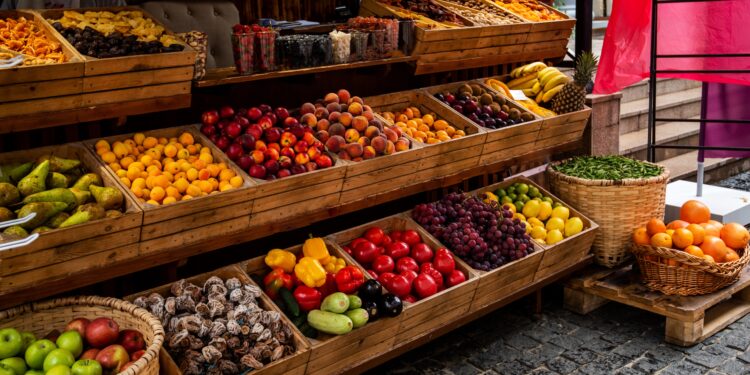OKLAHOMA CITY – Soon Native American Tribes across the United States could have greater autonomy in the way their citizens are distributed food. House Bill 3956, or the Food Distribution Program on Indian Reservations (FDPIR) Act of 2025, will amend the 2018 Farm Bill by authorizing the Secretary of Agriculture to enter into self-determination contracts with Tribes. The bill modifies a FDPIR pilot program which is currently being utilized by 16 tribes including the Cherokee Nation and the Chickasaw Nation. Its goal is to provide greater access to healthy foods for Tribal communities.
FDPIR currently provides food to eligible families living on reservations and serves as an alternative to the Supplemental Nutrition Assistance Program (SNAP). According to the bill, Indian Entities, or Tribes and Tribal Organizations, can negotiate and enter into self-determination contracts or self-governance agreements. Tribes can purchase agricultural commodities under the food distribution program for their reservation and administer programs, functions, services or activities related to their food distribution operations.
Tribes will be able to select the foods received in food packages, including domestically-sourced foods and will be able to establish direct contracts with the vendors that produce them. Data on how the Cherokee Nation and the Chickasaw Nation have benefited from the program has been published online.
According to the USDA’s website, Tribally-procured foods the Cherokee Nation has distributed includes beef chuck roast and ground beef chubs. These were distributed for a total of 36 months and were purchased through the 1839 Cherokee Meat Company.
The Chickasaw Nation’s tribally-procured foods includes ground beef, roast beef, dry hominy, stew meat, and pecans. Their USDA supplanted foods also includes wild rice, canned beef, and peanuts. These were distributed over the course of 24-33 months. The foods were purchased through Rolland Ranch Beef, Guderian Foods,and the Bryant Pecan Company.
Although the Muscogee (Creek) Nation is not currently part of the pilot program, College of Muscogee Nation Extension Coordinator Chris Azbell believes the bill would be beneficial to the Nation’s food distribution network. Currently MCN does not source locally, that is done through the USDA. According to Azbell, if food distribution were to become locally sourced, it would need a diverse selection of producers.
“We can start sourcing food locally, we can start growing out our agribusiness system,” Azbell said. “We can identify producers that sign these contracts and we don’t have to go all the way in. We can continue to utilize USDA in some of their distribution points to provide us food, however over time we can start transitioning that to local food access.”
Bill Sponsors and Pilot Testimonies
The bill is cosponsored by Oklahoma Third District U.S. Representative Frank Lucas and Kansas Third District Representative Sharice Davids (Ho-Chunk). According to Rep. Lucas, the pilot program that is already currently in effect has yielded positive results.
“I am very pleased to join my colleague from Kansas to introduce legislation that will ensure we honor our trust and treaty obligations,” Lucas said. “Tribes should be able to self-contract to administer quality, domestically produced food. Through the USDA’s FDPIR Demonstration Project, the tribes have proven that they are willing and able to successfully administer this program – now it is time to expand access to all tribes.”
Rep. Davids believes that the bill will be effective in meeting the unique needs of tribal citizens living on reservations. Particularly for those who live in food deserts, or low-income communities that lack nearby access to stores that offer affordable, healthy foods.
“For many Native families, accessing healthy, affordable food isn’t as simple as driving to the nearest grocery store,” Davids said. “Tribal communities face unique barriers, including long distances to grocery stores and supply chain disruptions that delay or cancel food deliveries. This bipartisan bill helps break down those barriers by ensuring tribal governments can better serve their communities and ensure families don’t go hungry.”
Both Chickasaw Nation Governor Bill Anoatubby and Cherokee Nation Principal Chief Chuck Hoskin Jr. spoke highly of the pilot program at a House Committee on Natural Resources Oversight Field Hearing on April 4. According to Governor Anoatubby, the Chickasaw Nation has distributed USDA foods to its citizens for the past 40 years. The pilot program enhances those services by providing the tribe with greater autonomy.
“The program is excellent,” Governor Anoatubby said. “The addition of a self determination program where we can purchase certain foods ourselves is certainly something we welcomed and has proven to be a very good change.”
Chief Hoskin remarked that the program gives his citizens a sense of normalcy, no different than a consumer going out to purchase groceries at the supermarket.
“It’s a good program, it’s an effective program, we’ve used it to good ends,” Chief Hoskin said. “These food distribution programs are in our tribal lands grocery store experiences in which the dignity of the citizen is maintained where they are able to access food that they need. This is beneficial because it allows us to buy locally.”
Azbell believes that the bill is a good step in the right direction for the tribes, however it will take time to build the agribusiness economy, including MCN’s. Although the fruits from a permanent bill might not be harvested immediately, Azbell said the result is worth it.
“People in general have gotten away from ag. It now comes down to just a few producers in the United States,” Azbell said. “Building that back is going to take time. And a willingness for people to go back and reengage with ag. You know, roll up their sleeves and get dirty. There’s a lot of opportunities.”





